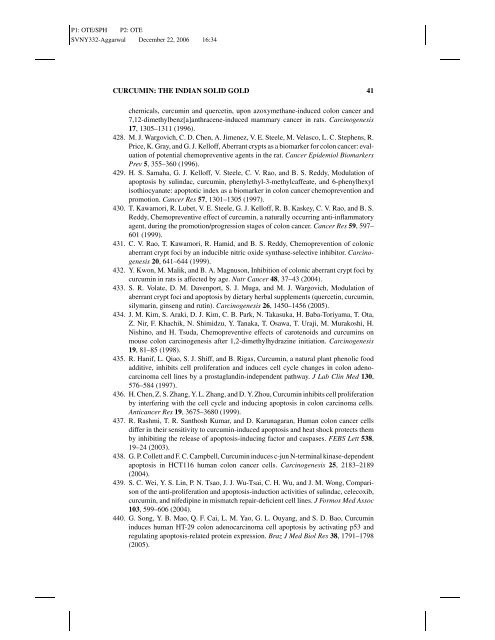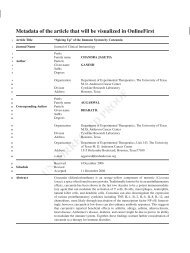CURCUMIN: THE INDIAN SOLID GOLD
CURCUMIN: THE INDIAN SOLID GOLD
CURCUMIN: THE INDIAN SOLID GOLD
Create successful ePaper yourself
Turn your PDF publications into a flip-book with our unique Google optimized e-Paper software.
P1: OTE/SPH P2: OTE<br />
SVNY332-Aggarwal December 22, 2006 16:34<br />
<strong>CURCUMIN</strong>: <strong>THE</strong> <strong>INDIAN</strong> <strong>SOLID</strong> <strong>GOLD</strong> 41<br />
chemicals, curcumin and quercetin, upon azoxymethane-induced colon cancer and<br />
7,12-dimethylbenz[a]anthracene-induced mammary cancer in rats. Carcinogenesis<br />
17, 1305–1311 (1996).<br />
428. M. J. Wargovich, C. D. Chen, A. Jimenez, V. E. Steele, M. Velasco, L. C. Stephens, R.<br />
Price, K. Gray, and G. J. Kelloff, Aberrant crypts as a biomarker for colon cancer: evaluation<br />
of potential chemopreventive agents in the rat. Cancer Epidemiol Biomarkers<br />
Prev 5, 355–360 (1996).<br />
429. H. S. Samaha, G. J. Kelloff, V. Steele, C. V. Rao, and B. S. Reddy, Modulation of<br />
apoptosis by sulindac, curcumin, phenylethyl-3-methylcaffeate, and 6-phenylhexyl<br />
isothiocyanate: apoptotic index as a biomarker in colon cancer chemoprevention and<br />
promotion. Cancer Res 57, 1301–1305 (1997).<br />
430. T. Kawamori, R. Lubet, V. E. Steele, G. J. Kelloff, R. B. Kaskey, C. V. Rao, and B. S.<br />
Reddy, Chemopreventive effect of curcumin, a naturally occurring anti-inflammatory<br />
agent, during the promotion/progression stages of colon cancer. Cancer Res 59, 597–<br />
601 (1999).<br />
431. C. V. Rao, T. Kawamori, R. Hamid, and B. S. Reddy, Chemoprevention of colonic<br />
aberrant crypt foci by an inducible nitric oxide synthase-selective inhibitor. Carcinogenesis<br />
20, 641–644 (1999).<br />
432. Y. Kwon, M. Malik, and B. A. Magnuson, Inhibition of colonic aberrant crypt foci by<br />
curcumin in rats is affected by age. Nutr Cancer 48, 37–43 (2004).<br />
433. S. R. Volate, D. M. Davenport, S. J. Muga, and M. J. Wargovich, Modulation of<br />
aberrant crypt foci and apoptosis by dietary herbal supplements (quercetin, curcumin,<br />
silymarin, ginseng and rutin). Carcinogenesis 26, 1450–1456 (2005).<br />
434. J. M. Kim, S. Araki, D. J. Kim, C. B. Park, N. Takasuka, H. Baba-Toriyama, T. Ota,<br />
Z. Nir, F. Khachik, N. Shimidzu, Y. Tanaka, T. Osawa, T. Uraji, M. Murakoshi, H.<br />
Nishino, and H. Tsuda, Chemopreventive effects of carotenoids and curcumins on<br />
mouse colon carcinogenesis after 1,2-dimethylhydrazine initiation. Carcinogenesis<br />
19, 81–85 (1998).<br />
435. R. Hanif, L. Qiao, S. J. Shiff, and B. Rigas, Curcumin, a natural plant phenolic food<br />
additive, inhibits cell proliferation and induces cell cycle changes in colon adenocarcinoma<br />
cell lines by a prostaglandin-independent pathway. J Lab Clin Med 130,<br />
576–584 (1997).<br />
436. H. Chen, Z. S. Zhang, Y. L. Zhang, and D. Y. Zhou, Curcumin inhibits cell proliferation<br />
by interfering with the cell cycle and inducing apoptosis in colon carcinoma cells.<br />
Anticancer Res 19, 3675–3680 (1999).<br />
437. R. Rashmi, T. R. Santhosh Kumar, and D. Karunagaran, Human colon cancer cells<br />
differ in their sensitivity to curcumin-induced apoptosis and heat shock protects them<br />
by inhibiting the release of apoptosis-inducing factor and caspases. FEBS Lett 538,<br />
19–24 (2003).<br />
438. G. P. Collett and F. C. Campbell, Curcumin induces c-jun N-terminal kinase-dependent<br />
apoptosis in HCT116 human colon cancer cells. Carcinogenesis 25, 2183–2189<br />
(2004).<br />
439. S. C. Wei, Y. S. Lin, P. N. Tsao, J. J. Wu-Tsai, C. H. Wu, and J. M. Wong, Comparison<br />
of the anti-proliferation and apoptosis-induction activities of sulindac, celecoxib,<br />
curcumin, and nifedipine in mismatch repair-deficient cell lines. J Formos Med Assoc<br />
103, 599–606 (2004).<br />
440. G. Song, Y. B. Mao, Q. F. Cai, L. M. Yao, G. L. Ouyang, and S. D. Bao, Curcumin<br />
induces human HT-29 colon adenocarcinoma cell apoptosis by activating p53 and<br />
regulating apoptosis-related protein expression. Braz J Med Biol Res 38, 1791–1798<br />
(2005).



